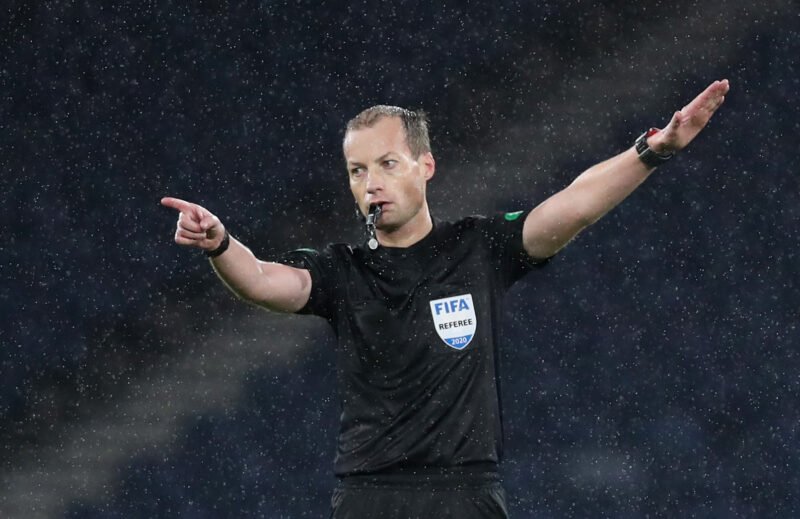In the aftermath of Rangers’ 2-1 defeat to Celtic on December 30th, a match marred by controversy, not due to the loss itself but rather the fallout from a contentious handball incident, a narrative far too familiar began to unfold. The Ibrox outfit’s immediate response was to launch a vehement campaign against the Scottish Football Association (SFA) and referee Willie Collum.
The call for a penalty, waved off by Collum on VAR, became the eye of a storm, one which, upon closer examination, revealed no material impact on the game’s outcome. Yet, this detail was lost in the ensuing outcry from Rangers, marking the beginning of a deflective strategy that has become a discernible pattern, especially following defeats to their fiercest rivals.
The media quickly picked up the narrative set by Rangers, running with it, thereby amplifying the club’s discontent. The demands for audio, despite knowing it would be due to them anyway after the 22nd round of fixtures, and the subsequent meeting with the SFA, were steps in a dance of deflection and obfuscation. The narrative took a darker turn when it was leaked that Rangers had requested Collum not officiate their games again, not coming from Rangers themselves but their lap dogs in fan media. This insinuation being that Collum can not officiate a Rangers game fairly, this request/leak was enough for a torrent of bigotry and prejudice on social media and fan forums. Images and videos of Willie Collum performing a reading at a Catholic mass were circulated by Rangers fans, purportedly as ‘Exhibit A’ to argue he officiates Rangers games with bias.
A year earlier Collum denied what looked to be a stonewall penalty to Celtic in the reverse fixture at Ibrox. Observable reality doesn’t show a pattern of bias, it shows a referee not very well equipped to do his job; the distinction is important. Nearly every SPFL club has had issues with Collum over the years.

This episode is not isolated but indicative of a deeper, more insidious issue, one that Andrew Smith poignantly addressed in his article on Rangers’ ‘superiority syndrome’ and anti-Catholic bigotry. Smith shed light on the entrenched sense of entitlement and bigotry that has long been cultivated within certain segments of the Rangers fanbase. The incident with Collum is a manifestation of this superiority complex and the refusal to engage in self-reflection or acknowledge the bigotry that permeates through the club’s culture.
The incident is a stark reminder of the real-world consequences of such rhetoric and behavior. Rangers’ actions, whether intentional or not, have given license to a faction of their support to express and act upon their deep-seated bigotry. This is not simply about a football match or a disputed call; it’s about a club’s responsibility to its community and the broader society. The attempt to deflect from a fair and square defeat by fueling a narrative of victimhood and bias is not just poor sportsmanship; it’s dangerous.
Rangers, as a club with significant influence, has a duty to lead by example. It’s incumbent upon them to address the elements within their fan base that cling to outdated and harmful beliefs. The path forward requires a clear and unequivocal stance against all forms of bigotry and a commitment to fostering an environment of respect and fair play, both on and off the field.
As Andrew Smith rightly pointed out, the media, authorities, and society at large must also play their part. There can be no more turning a blind eye or deaf ear to the issues at hand. It’s time for a collective effort to challenge and change the narrative, to ensure that our game isn’t tainted by hatred and prejudice. The call is clear: It’s time for Rangers, and indeed all involved, to step up and be the change that is desperately needed.
This article will more than likely be dismissed as mere ramblings from a Celtic page by a non-practicing Catholic writer aiming to take potshots at rivals, but that’s far from the truth. The call for transparency in Scottish football, including Rangers’ demands, is welcome. However, the line is drawn when officials are put in precarious situations where their faith influences debates over on-field decisions. It’s about fairness and integrity, not rivalry. The more transparency we have, the less room for ambiguity going forward for all clubs, not just Celtic and Rangers. This ensures a level playing field where decisions are made clear and accountability is upheld, fostering a healthier, more respectful football environment for everyone involved.









Hate to state the obvious but ‘Nowhere to hide in a referees top’.
The time to state your affliction/leanings has not been well posted on the the Sfa complaints site.
As it’s Red, White and Blue.